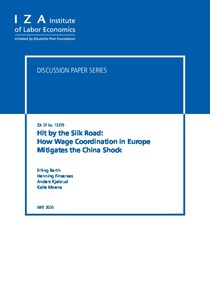Hit by the silk road: how wage coordination in Europe mitigates the China shock

Barth, Erling ; Finseraas, Henning ; Kjelsrud, Anders ; Moene, Karl Ove
Institute of Labor Economics, Bonn
IZA - Bonn
2020
45 p.
wage policy ; wage determination ; competition ; collective bargaining ; globalization
Discussion Paper
13259
Wages and wage payment systems
English
Bibliogr.
"Coordination in collective wage setting can constrain potential monopoly gains to unions in non-traded-goods industries. Countries with national wage coordination can thus stabilize overall employment against fluctuations and shocks in the world economy. We test this theory by exploring within-country variation in exposure to competition from China in 13 European countries. Our causal estimates demonstrate that in countries with uncoordinated wage setting, regions with higher import exposure from China experienced a marked fall in employment, while countries with wage-coordination experienced no such employment effects. We test our main mechanism against other explanations, and show that our findings are robust to alternative measures of wage coordination, industry classifications, and trade exposure."
Digital
The ETUI is co-funded by the European Union. Views and opinions expressed are however those of the author(s) only and do not necessarily reflect those of the European Union or the ETUI.